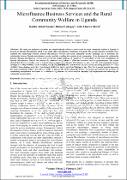Microfinance business services and the rural community welfare in Uganda

View/
Date
2017-02Author
Kaziba Mpaata, Abdul
Lubogoyi, Bumali
Okiria, John Charles
Metadata
Show full item recordAbstract
The study was designed to examine the relationship microfinance services and the rural community welfare in Uganda. It focused on Masaka Microfinance which is one of the oldest microfinance institutions in Uganda. The specific objectives included; (1) to establish the relationship between Masaka Microfinance services and rural community income earnings; (2) to determine the relationship between Masaka microfinance services and the resulting job creation in the community; (3) to document the relationship between Masaka microfinance services and community saving practices. A sample of 78 respondents of who were beneficiaries of Masaka Microfinance Limited was purposively contacted out of whom 52 filled and returned complete questionnaires. The results showed that there is a positive and significant relationship between Masaka Microfinance services and; (1) rural community income earnings (r = .690 p<0.0001); (2) the resulting jobs in the community (r = .540 p<0001); and (3) community saving practices (r = 736 p<0.0001). These findings imply that microfinance institutions have a significant bearing on any effort that is geared towards improving the rural community welfare. Therefore, in order to improve the rural community welfare in Uganda, government has to focus on establishing microfinance institutions as a solution to supplement the wealth creation campaign, self employment and enhancing the community saving culture.
